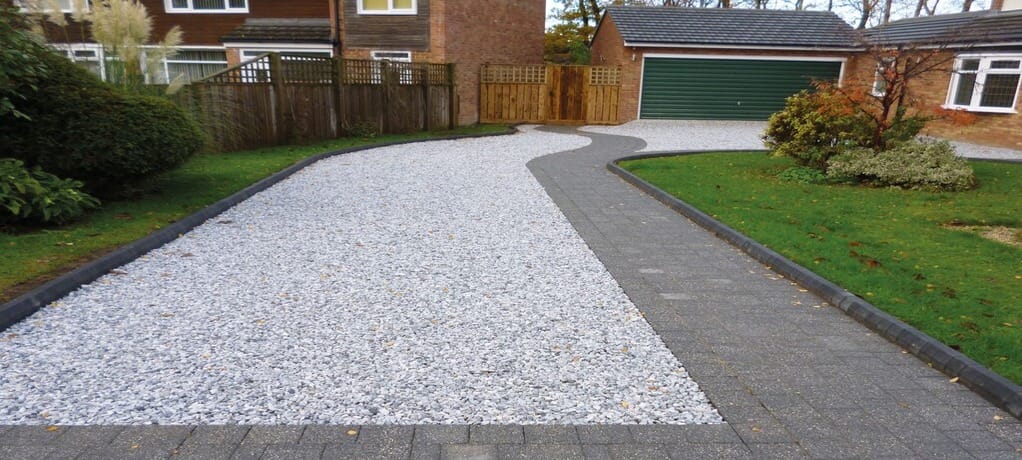
Choosing the Right Materials for Your Driveway
Published on August 26, 2025
Posted in Inspiration
by MKM
5 mins min read
Your driveway is one of the first things visitors notice about your home. Beyond creating a great first impression, the right material can save you money on maintenance while helping protect the environment. But with so many options available, how do you choose the perfect solution for your property?
Let's explore the key materials and considerations that will help you make the right decision for your home and budget.
Whether you're upgrading an existing driveway or starting from scratch, it's important to think beyond just aesthetics. Consider how each material performs in your local climate, how much maintenance you're comfortable with and whether sustainability is a priority for your household. These factors will help guide you towards a solution that not only enhances your home's kerb appeal but also stands the test of time.
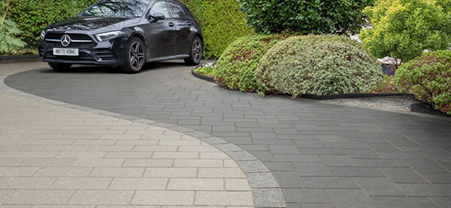
Understanding Your Material Options
When it comes to driveway materials, MKM offer several excellent choices, each with its own benefits and aesthetic appeal.
Concrete block paving remains one of the most popular solutions, and it's easy to see why. With a vast range of colours and finishes available, you can find something to suit virtually any budget. Whether you prefer the classic rectangle blocks laid in a herringbone pattern, tumbled blocks that mimic old-fashioned setts, or special-shaped blocks for creating unique designs, concrete paving offers incredible versatility.
Permeable paving is rectangular in shape and comes in a wide choice of colours and finishes. Its structured appearance suits both contemporary and classic properties, offering a clean and polished look. For a more traditional finish, natural stone setts create a charming ‘cobbled street’ effect. Their varied textures and tones allow for everything from simple layouts to intricate, creative designs. Both materials offer long-lasting durability and visual appeal.
Aggregates come in a range of sizes and colour and finding one to complement your home's style is straightforward. They offer a practical solution that's particularly suited to longer driveways or rural properties.
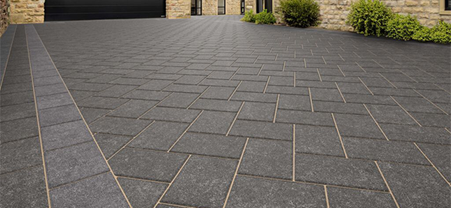
A More Sustainable Choice: Permeable Paving
Environmental considerations are becoming increasingly important for homeowners, and permeable paving offers an excellent sustainable solution. Like concrete block paving, permeable options come in rectangular shapes with various colours and finishes to choose from.
The key difference lies in how permeable paving handles water. This innovative material allows water to drain naturally through the surface, reducing runoff and helping prevent flooding. This drainage capability makes permeable paving an environmentally responsible choice that also helps manage water on your property more effectively.
Permeable paving requires different installation techniques compared to standard concrete block paving. If you're considering this option, it's worth seeking professional advice to ensure it's suitable for your specific location and requirements.
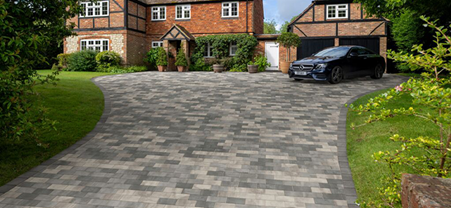
Driveway Drainage: Why It Matters More Than You Think
Proper drainage should be a top priority when planning any driveway project. Poor drainage can lead to puddles, ice in winter, and even structural damage over time.
Traditional materials like concrete blocks and aggregates rely on proper ground preparation and grading to direct water away from your property. The installation must include adequate fall towards drainage points to prevent water from pooling on the surface.
Permeable paving takes a different approach by allowing water to pass through the material itself. This can be particularly beneficial in areas prone to heavy rainfall or where local planning requirements favour sustainable drainage solutions.
When planning your project, consider how water currently behaves on your property during heavy rain. Does it pool in certain areas? Does it run towards your house or neighbouring properties? These observations will help you and your installer design the most effective drainage solution.
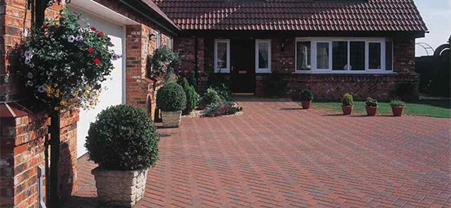
Durability and Maintenance
How long will your driveway last? The answer depends on a few key factors:
Material quality – Some surfaces are naturally more hardwearing than others. For example, concrete and block paving tend to offer greater longevity than gravel, especially when properly maintained.
Installation standards – A professionally installed driveway with a solid sub-base and good drainage will last significantly longer than one laid without proper preparation.
Local climate – Weather conditions can have a big impact. Repeated freezing and thawing, heavy rainfall, or prolonged heat can all accelerate wear and tear. Sealing the surface properly, especially with block paving or concrete, can help protect against moisture penetration and temperature-related damage, making your driveway more resilient in the long run.
Usage frequency – A driveway used daily by multiple vehicles will wear faster than one used occasionally.
Weight load – Heavier vehicles, such as vans or delivery trucks, place more strain on the surface than standard cars.
Maintenance – Regular cleaning, sealing, and prompt repairs can extend the lifespan of your driveway by years.
On average, a well-installed and properly maintained driveway can last anywhere from 15 to 30 years. Some materials, like high-quality block paving, may last even longer with the right care.
To help reduce future maintenance, consider installing a weed membrane during construction. This simple addition helps prevent weeds from growing through the surface, saving you time and effort in the long run.
Making Your Final Decision
When choosing your driveway material, here are a few key things to consider:
What’s your budget for both materials and installation?
- Costs vary widely. Gravel and aggregates are budget-friendly, while natural stone and block paving tend to be more expensive. Don’t forget to factor in labour and groundwork.
How important is environmental sustainability to you?
- Permeable paving is a great eco-friendly option, helping manage rainwater and reduce runoff, especially useful in areas with strict drainage regulations.
What style best complements your home’s architecture?
- Traditional homes often suit natural stone or tumbled blocks, while modern properties may benefit from sleek concrete or permeable paving.
What are your local drainage requirements?
- UK planning rules may require sustainable drainage systems (SuDS), particularly for larger driveways. Check with your local council before starting work.
How much ongoing maintenance are you prepared to undertake?
- Block paving may need occasional jet-washing and weed control. Aggregates require topping up, while permeable surfaces need less frequent attention.
Remember, materials are just one part of the cost. Site preparation, professional installation, and any necessary council approvals should all be included in your overall budget.
Creating Your Perfect Drive
Choosing the right driveway material doesn't have to be overwhelming. Whether you opt for the versatility of concrete block paving, the environmental benefits of permeable options, the timeless appeal of natural stone setts, or the practicality of aggregates, each material can create a beautiful, functional driveway when properly installed.
The key is matching your choice to your specific needs, budget, and environmental goals. To receive expert advice on the right kind of materials to use for your driveway, talk to your local in-branch specialist. Find your nearest branch.
